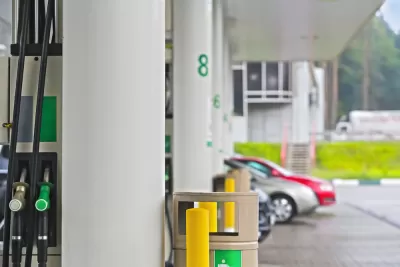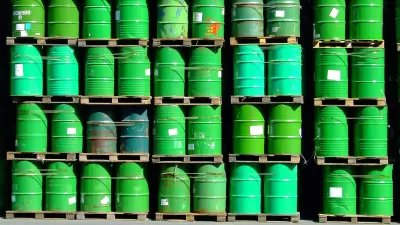Global oil prices may skyrocket when the European Union, which receives about one third of its oil from Russia, enacts a partial ban on importing Russian oil at the end of the year to stop financing Russia's war in Ukraine.

President Biden has welcomed the recent decline in gasoline prices and he wants you to know about it, reported Jim Tankersley, a White House correspondent for The New York Times, on July 22.
After topping $5 a gallon in June, the price of gasoline has fallen for more than a month. The Biden administration wants to tell you about it. Again and again.
President Biden and his top aides are in an all-out campaign to trumpet what is, as of Friday, 38 consecutive days of declines in the AAA average gas price nationwide.
The downward trend continues, with national gas prices averaging $4.35 per gallon on Monday, July 25, resulting from a drop in demand and lower oil prices, according to AAA.
The steady decline is due to low domestic demand for gasoline and oil prices that remain in the mid-$90s per barrel. The price of gas has now fallen every day since hitting a record $5.01 on June 14.
Warning ahead – EU partial oil embargo
Two weeks earlier, Tankersley reported in the source article for this post that “White House officials fear a new round of European penalties aimed at curbing the flow of Russian oil by year-end could send energy prices soaring anew, slamming already beleaguered consumers and plunging the United States and other economies into a severe contraction.”
Europe, which continues to guzzle more than two million barrels of Russian oil each day, is set to enact a ban on those imports at the end of the year, along with other steps meant to complicate Russia’s efforts to export fuel globally.
While Mr. Biden pushed Europe to cut off Russian oil as punishment for its invasion of Ukraine, some forecasters, along with top economic aides to the president, now fear that such policies could result in huge quantities of Russian oil — which accounts for just under a tenth of the world’s supply — suddenly taken off the global market.
On June 3, the European Union adopted a partial ban on importing Russian oil, set to begin in December 2022 and February 2023, according to the Center for Strategic and International Studies. “It took nearly a month of negotiations to achieve unanimous support for this round of sanctions, and a compromise on pipeline imports was unavoidable,” wrote Ben Cahill on June 9.
[Related posts: Banning Russian Oil, Part II, May 12, and Banning Russian Oil, March 10, 2022]
The EU's partial Russian oil embargo could result in “a depletion in supply [that] could send oil prices soaring to $200 per barrel or more, translating to Americans paying $7 a gallon for gasoline,” adds Tankersley.
Oil price mitigation strategy
“To prevent that outcome, U.S. officials have latched on to a never-before-tried plan aimed at depressing global oil prices — one that would complement European sanctions and allow critical flows of Russian crude onto global markets to continue but at a steeply discounted price,” continues Tankersley.
The plan would be to place a cap on Russian oil prices, i.e., set a maximum price on Russian oil that would be below the actual market price of oil. But would Russia agree to such a discount?
The novel strategy is based on the maritime shipping of oil, specifically its financing and insurance requirements. Russia would continue to sell oil to customers outside of the Ukraine's Western allies that have embargoed it, but at a discount set by the U.S. and the EU.
Some economists and oil industry experts are skeptical that the plan will work, either as a way to reduce revenues for the Kremlin or to push down prices at the pump. They warn the plan could mostly enrich oil refiners and could be ripe for evasion by Russia and its allies. Moscow could refuse to sell at the capped price.
Treasury Secretary Janet Yellen promoted the price cap strategy at the Group of 20 (G20) finance ministers meeting in Bali, Indonesia in mid-July, reported CNBC on July 14.
“A price cap on Russian oil is one of our most powerful tools to address the pain that Americans and families across the world are feeling at the gas pump and the grocery store right now," said Yellen. “A limit on the price of Russian oil will deny Putin revenue his war machine needs.”
Finance Minister Sri Mulyani Indrawati of the host nation, Indonesia, was of a different opinion, pointing to the imbalance between supply and demand. “Prices are high because demand outstrips supply, which has been disrupted, and a price ceiling will not resolve that, she said,” reported CNBC on July 15.
An energy expert scoffed at the strategy, suggesting it would backfire, reported CNBC on July 18.
“Those Europeans and Americans that are talking about $40 a barrel, what they’re going to get is $140 a barrel,” said Gal Luft, co-director of the Institute for the Analysis of Global Security.
Set to go
Bloomberg News reported on July 20 that the price cap was ready to be implemented in December alongside a European Union insurance ban on vessels containing Russian oil that would go into effect that month.
FULL STORY: Fears of Another Gas Shock Drive Biden to Seek Price Cap on Russian Oil

Maui's Vacation Rental Debate Turns Ugly
Verbal attacks, misinformation campaigns and fistfights plague a high-stakes debate to convert thousands of vacation rentals into long-term housing.

Planetizen Federal Action Tracker
A weekly monitor of how Trump’s orders and actions are impacting planners and planning in America.

In Urban Planning, AI Prompting Could be the New Design Thinking
Creativity has long been key to great urban design. What if we see AI as our new creative partner?

King County Supportive Housing Program Offers Hope for Unhoused Residents
The county is taking a ‘Housing First’ approach that prioritizes getting people into housing, then offering wraparound supportive services.

Researchers Use AI to Get Clearer Picture of US Housing
Analysts are using artificial intelligence to supercharge their research by allowing them to comb through data faster. Though these AI tools can be error prone, they save time and housing researchers are optimistic about the future.

Making Shared Micromobility More Inclusive
Cities and shared mobility system operators can do more to include people with disabilities in planning and operations, per a new report.
Urban Design for Planners 1: Software Tools
This six-course series explores essential urban design concepts using open source software and equips planners with the tools they need to participate fully in the urban design process.
Planning for Universal Design
Learn the tools for implementing Universal Design in planning regulations.
planning NEXT
Appalachian Highlands Housing Partners
Mpact (founded as Rail~Volution)
City of Camden Redevelopment Agency
City of Astoria
City of Portland
City of Laramie





























